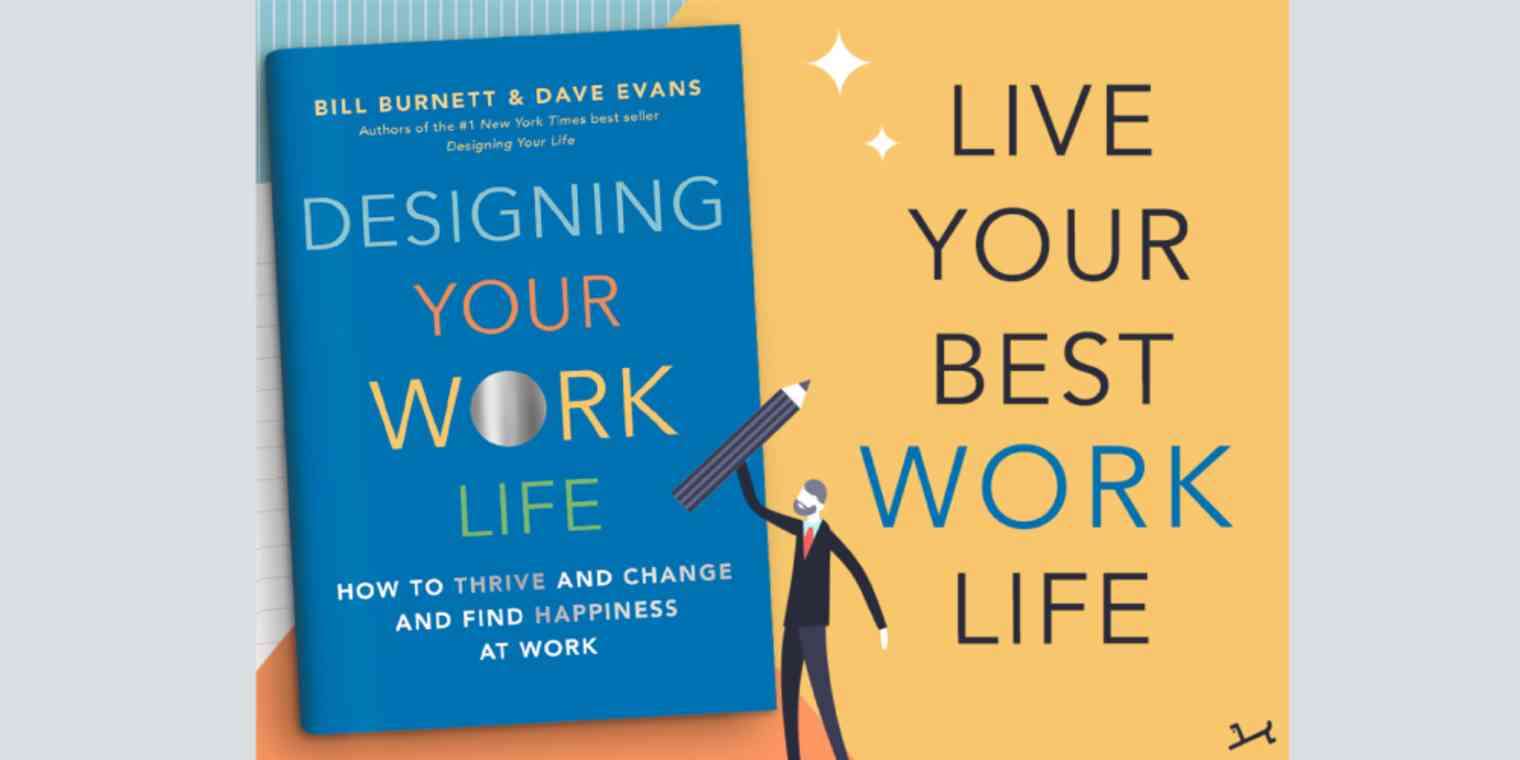What follows is an excerpt from Chapter 5 of Designing Your Work Life, the newest book from Bill Burnett and Dave Evans, authors of the #1 New York Times bestseller Designing Your Life. You can order the book here or from your favorite retailer.
At the end of the workday, we are the one responsible for making our job feel challenging and fun. Whether we are driving a bus or driving a corporate merger, this is true for any and every job. And to make our job fun and rewarding, we need to again turn to the psychologists. The research on human motivation, called "self-determination theory," says that we are intrinsically motivated animals, and, in addition to responding to external motivations, a full understanding of human motivation requires an understanding of our innate psychological needs for _A_utonomy, _R_elatedness, and _C_ompetence (ARC).
Now, some of you may be putting on the brakes right now.
Psychological needs? That's great in theory, but I need cash. That will motivate me and get me engaged with my work faster than anything. Let's discuss the ARC of my bank account!
Good question, and of course we need to have our financial needs met. But research shows that humans are weirdly motivated by things other than cash, especially when they have enough to live on—things like curiosity and the inherent challenge of solving puzzles. In his book Drive: The Surprising Truth About What Motivates Us, Dan Pink describes some strange results from the psychology of motivation as revealed by self-determination theory.
. . . human motivation seemed to operate by laws that ran counter to what most scientists and citizens believed . . . we [thought we] knew what got people going. Rewards—especially cold, hard cash—intensified interest and enhanced performance. [However, what the self-determination theory psychologists found] was almost the opposite. When money is used as an external reward for some activity, the subjects lose intrinsic interest for the activity . . . Human beings . . . have an inherent tendency to seek out novelty and challenges, to extend and exercise their capacities, to explore, and to learn.
Dan was describing the work of Edward Deci, a pioneering psychologist, who, along with Richard Ryan and others, has spent the last forty years developing the notion that, along with our primitive external motivations (the drive for food, shelter, safety, etc.), humans have powerful intrinsic motivations that are in some ways their own reward. In other words, humans will do things because they are just interesting. We are curious animals. And Deci and Ryan and others have demonstrated that you can mess up the intrinsic reward system (solving a puzzle because it's interesting) by introducing extrinsic rewards (like paying people to complete the same puzzle). When you pay people for tasks that utilize the intrinsic reward system, their performance actually goes down.
That's the weird paradox.
So let's look at our innate psychological needs for autonomy, relatedness, and competence.
Before diving in, here's a quick intro to the concept of Designing Your Work Life with Bill and Dave.
Autonomy, at its most basic, is the need to control our own life. It's a human drive and an innate psychological need. We all want to be in a position at work where we are able to control aspects of what we do, who we do it with, and when we do it. Deci and Ryan write, "At a phenomenological level, human autonomy is reflected in the experience of integrity, volition, and vitality that accompanies self-regulated action . . ."
At work, you develop your autonomy by showing up in the work that you do and deciding to do it as good or better than is required. When you get in the habit of overdelivering on the job, good things start to happen.
Relatedness is about connecting to your people and your community. We develop and sustain our relatedness by engaging with our fellow workers, collaborating well on projects, and being empathetic to the needs of those we work with and work for. The drive for connection is a strong human motivator and a basic component of our evolutionary history. Humans, by themselves, are not very strong or fast animals. In the wild, almost all predators are faster and more deadly. We had to learn to live together, and hunt together, in order to survive. As we evolved, the best survival strategy was to form strong family and tribal groups. This intrinsic need for relatedness shows up at work, too.
Think of a time when you were energized and jazzed by being part of a bigger project or purpose. Being part of a team and working hard for that team shows up in many aspects of our lives—from sports, to community groups, to social movements—and radical collaboration is a form of relatedness that designers do naturally.
In contrast, being isolated in a matrix of sterile cubicles, working all by yourself, on tasks that have no obvious connection to the mission of the team, tribe, or company is not a healthy work environment and is not likely to be where you do your best work.
Increasing your relatedness will increase your happiness—at work and in life.
Competence is just what it sounds like. We all want to be good at what we do. Some of us even want to be the best at what we do. We develop our competency by (and there is an element of grit in this one) practicing our craft until we have achieved what others would call mastery, and then going on to "out-master" ourselves through even more concerted practice. Your grit and ability to persevere is key here. Competence feels intrinsically good. That's why it is important to be able to identify with the value of the work we do. To do work well, we need to develop our skills, and if we're developing skills we truly care about, we will be driven to improve our competence. In contrast, if we are not engaged in our job, then we really don't care about improving, much less mastering, the skills required to do the job well.
There are two common areas where we need to invest in growing our competency: our areas of natural strength that are useful in our work and our areas of natural weakness, which are required in our job. In the former, the idea is to take your natural strengths (like leading small groups of people) and pushing yourself to the next level (becoming a world-class teaming expert). It's easy to rely on our natural strengths "as is" and just enjoy them. But to fully reap the benefits of your strengths, you want to grow them.
The reverse is equally true. Most of us encounter tasks in our work that we just aren't good at but are absolutely required. For instance, if you're going to be a university instructor, you have to be good at public speaking.
Bill is still an introvert, so after teaching all day he’s happy . . . and exhausted. The best thing for Bill to do after a day in the front of the classroom is to go home and take a nap. By contrast, Dave is an extrovert. So after a day of teaching, Dave wants to ride his bike for two hours to blow off the extra energy, and then keep his wife up late, telling her stories about class. Bill and Dave both love teaching and have worked hard to build a high level of competence in it, but they still experience it in different and personal ways. When pushing your competency to attain true mastery at something, it’s personal—you have to make it your own and do it in a way that fits you. When pushing your competency to attain true mastery at something, it's personal—you have to make it your own and do it in a way that fits you.
Shout-out to managers
As a manager, you can design opportunities for your employees to experience autonomy, relatedness, and competence. It's in your best interest as an employer to encourage the conditions that allow your employees to create ARC on the job. You should be constantly asking yourself: Am I allowing employees to meet their fundamental need for independence and autonomy? Do I trust them? Are my teams self-directed? Are my people learning on the job?
If you are not encouraging ARC on the job, it might be time to check your disengagement rates. And your job retention rates. It costs anywhere from 20 percent to 200 percent of an employee's salary to replace that employee, with the highest number being spent to replace key employees, managers, and executives. These costs aren't reflected in your bottom line, but can be measured in lowered productivity, decreased morale, and increased stress, all leading to the potential burnout of your staff. The people who don't quit are often left to work harder, covering for the employee who quit, while you hire a replacement. All of this adds to the time spent interviewing, the costs of recruitment, and training new staff. If you think your employees are leaving over money—think again! People don't quit jobs—they quit bosses. Investing in raising the ARC of your employees is a direct investment in your success as a manager.
Passion is not the starting point
We don't believe in the idea that if you know your passion, you know what to do with your life. Passion—a kind of self-organizing singular drive toward an objective—is rare. And the research shows that passion is generally something that emerges in response to working hard in an area of interest. Therefore, you may not know your passion for years. We've noticed that when a true passion does surface early in life, it happens more often than not in people who are drawn to a life in the arts. Dancers, singers, designers, and creatives of all stripes have a higher percentage of "start with your passion" motivation than most. And that makes sense. These are people whose Maker Mix is overwhelmingly focused on expression—which is a more inside-out (or intrinsic) than outside-in (or extrinsic) type of work motivation. The artist's work satisfaction comes mostly from within. For most of the rest of us, our work is extrinsic—interdependent on other people, situations, systems, etc. A fireman has trucks, special equipment, a large team of very specially trained crewmembers, and a complex relationship with the city government, the police, and the local populace. Most careers are like that—with lots of complex interdependencies beyond yourself—so it takes years of living in the world and experiencing lots of situations to discern where you really fit (which is why the research tells us that it takes most people until their mid-thirties to really feel at home in their careers).
Don't be concerned that you are not yet passionate about your work. Passion may take time to form. To build on the process of passion-building, stay curious and pay attention to what attracts you. You can notice at each step of your career, if you are paying attention, whether the thing you're doing is leading, more or less, in the direction of a passion. There are a few key indicators that something will not lead to your passion:
You are getting bored with the tasks you do as part of your job.
You are not willing to "stay late" on any of your projects.
You are not working to perfect the skills it takes to be really good.
You are not keeping up with what is going on in your field.
You are not curious about what others in your profession are doing.
We all want a meaningful job and work that matters. And the good news is you are the boss, so get curious and start prototyping toward a better job.
The drive for autonomy, relatedness, and competence is part of your humanness; these qualities are part of your intrinsic motivation system. Everyone has these motivations, and when you can satisfy these motivations at work, you are likely to do your best work, feel more connected to your colleagues, and experience your work as meaningful. This is what it means to develop the ARC of your career.
excerpted from Designing Your Work Life, Knopf - used with permission © 2020 Bill Burnett & Dave Evans - not for distribution





